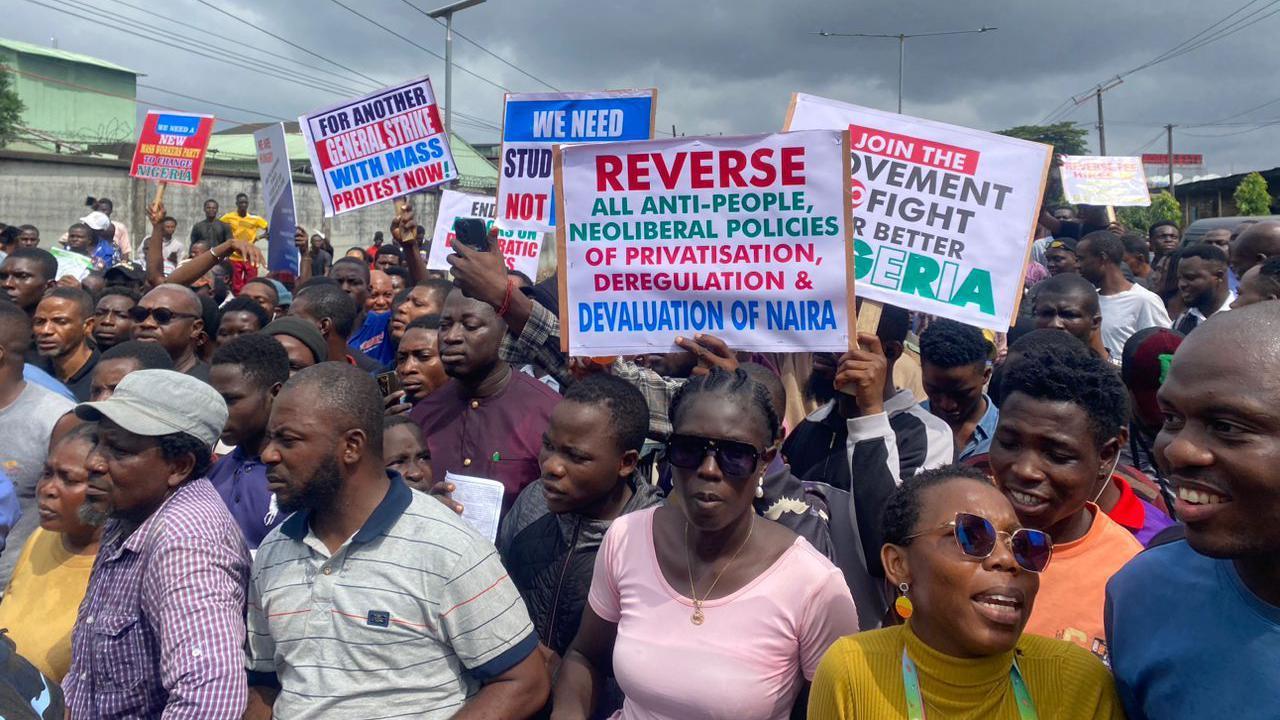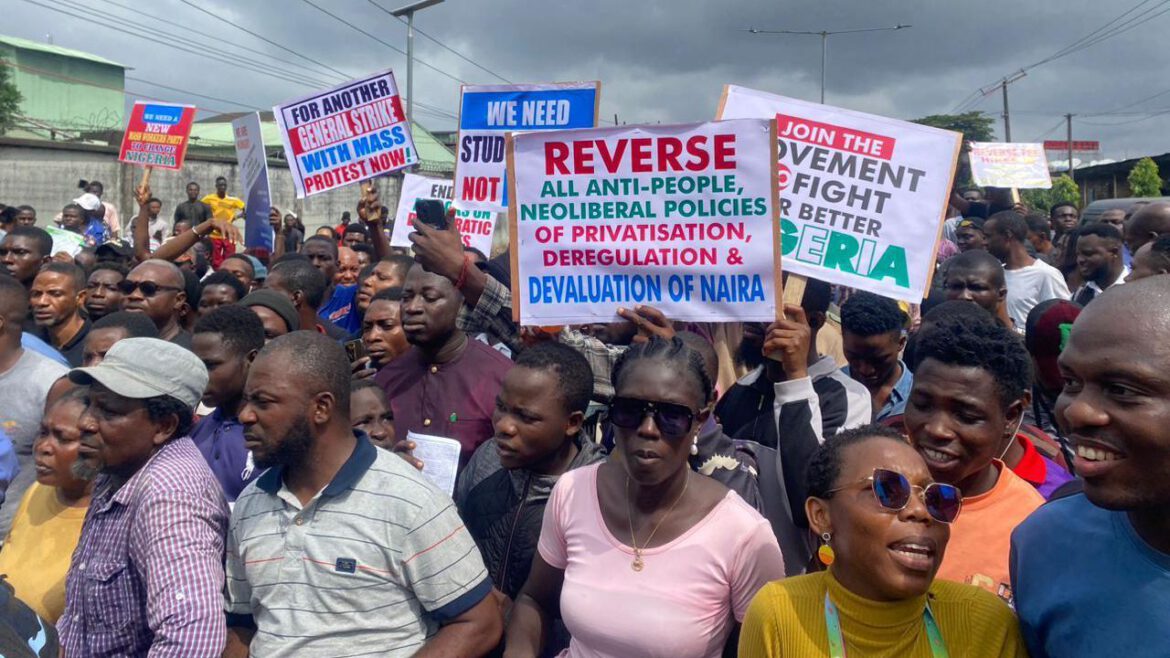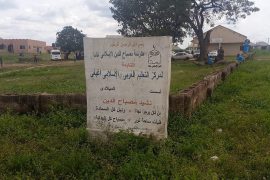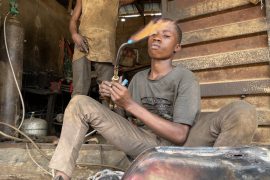
Protest don start for across Nigeria as young pipo dey vex sake of hunger and high cost of living for di kontri.
Di protest dey go ahead despite all di begging and last minute efforts wey di Nigeria goment, security agencies, and even traditional rulers try make e for no hold.
Dia fear na sake of di EndSARS protest wey bin rock Nigeria for October 2020, wey later cause destruction of goment and private properties, and eventually end wit “bloody massacre”, according to one panel of investigation.
BBC News Pidgin observe on Thursday morning say youths gada for various cities like di capital Abuja, Lagos and Port Harcourt, and carry placards and dey sing we-no-go-gree songs.
But di drums of anger and frustration bin don dey beat for some time now, and dis article go try to analyse wetin bin don happun and why e don reach dis stage of we-no-go-gree.
Subsidy don go
Di genesis of di wahala na three words wey Presido Bola Ahmed Tinubu bin tok during im inauguration as Nigeria new president on 29 May, 2023: “Subsidy do go gone”.
Nigeria goment bin dey subsidise petroleum products wey dem dey import into di kontri sake of say di four petrol refineries for di kontri no dey work. So Nigeria, even though na one of di biggest producers of crude oil for Africa, na also one of di biggest importers of petroleum products.
Dis subsidy dey help Nigerians to buy Premium Motor Spirit (PMS) simply known as petrol, kerosene, diesel, etc for cheaper prices dan wetin e dey sell for di international market.
- Nigeria Bar Association set up free legal services for ‘End Bad Govment’ protesters
- ‘End bad governance’ protesters reveal plans for August 1
- Why Nigerians wan protest on August 1?
E don tey wey previous presidos bin wan stop di subsidy sake of say e dey increase evri day and e dey chop deep into di moni wey goment for take do oda tins.
For January 2012, Tinubu bin lead ogbonge protest as Goodluck Jonathan wey be di presido dat time announce say im go stop subsidy.
Even though Jonathan bin announce one programme wey e call ‘Subsidy Reinvestment and Empowerment Program’ (Sure-P), to tackle di hardship wey fit follow, Nigerians still insist say make subsidy come back, and afta several days of “Occupy Nigeria” protests, Jonathan bin no get choice but to return di subsidy.
Sabi pipo for politics tok say di sudden declaration of Tinubu say subsidy don go, on im first speech as Presido, no only shock di citizens, e also shock di economy and plenty tins go out of control.
Floating of naira
E no reach one month afta Tinubu remove fuel subsidy, di CBN also announce di floating of di Nigerian currency, and dem tok say di policy na to “allow the local currency naira to trade more freely against the United States dollar”.
Bifor dat announcement, di naira bin dey exchange for 460 to one dollar, but few days afta, di naira fall to 750 for one dollar.
Today, di situation na about 1,600 naira to one dollar, and dis na beta improvement from February dis year wen one dollar na almost N2,000.
Dis situation don lead to increase in prices of goods and services for Nigeria by more dan three or four times.
“You no need to get PhD to know say di decision to float currency for kontri wey dey depend on imports na big disaster,” Economist Ndubisi Ekekwe bin tok dat time
But anoda financial expert, Femi Oladehin, bin also tell BBC News Pidgin dat time say “for medium and long term, di move get ogbonge benefits for di kontri in terms of investment.”
Food prices too high
As goment remove fuel subsidy, almost immediately di price of transportation increase times two or three across Nigeria.
Dis kon affect di movement of food products from di northern part of Nigeria wia majority of di food dey come from, to di southern regions.
Add dat one to di rising insecurity wey don prevent farmers from accessing dia farms across di north, and wetin you go get na hyperinflation.
Latest figures by di National Bureau of Statistics show say di price of some basic food items like beans, tomatoes, potatoes, onions, garri, etc increase by ova 200%.
Dis food price increase look like na im be di main tin wey dey angry majority of Nigerians and goment efforts by sharing trucks of rice and grains as palliatives to state goments to share to pipo don dey described by sabi pipo as too little.
Electricity tariff increase
On top di increase in food and transportation prices, di ministry of power also announce say di price of electricity tariff go increase by more dan 200%, from 68 naira per kilowatt-hour to 225 naira. Dem later bring am down to 209 naira per kilowatt-hour.
Di increase no affect evribodi but na for pipo wey dey di band A category, and according to di ministry, dis category na pipo wey go dey get electricity for 20-24 hours in a day.
Di organised labour also protest against dis increment. Dem describe am as insensitive and di distribution of electricity consumers into categories dey discriminatory.
Wetin goment don do?
Di Nigerian goment don adopt some policies wey dem tok say dey targeted to make life easier for Nigerians.
One of dem na di adoption of di CNG-powered transportation system. For dis programme, goment tok say dem go provide mass transportation vehicles wey go dey use Compressed Natural Gas (CNG) wey dem say dey cheaper dan petrol.
Di Tinubu goment say dem go buy hundreds of dis CNG-vehicles for mass transportation, and e also order all ministries and agencies say any vehicle wey dem go buy going forward gatz be CNG-powered.
“We must to set di example as public officials in leading di way to dat prosperous future wey we dey work to achieve for our pipo. E suppose start wit us, and wen dem see say we serious, Nigerians go follow our lead,” di President tok.
However, observations by BBC show say dis CNG-vehicle initiative neva really take off. Abuja, di capital city for instance, still no get any goment mass transport scheme reach today.
Also, afta months of negotiation and a nationwide protest by organised labour unions, Presido Tinubu recently sign new minimum wage bill into law, wey raise di salary of di lowest paid goment worker from 30,000 naira to 70,000 naira, even though di labour unions bin demand for more dan three times of dat amount.
Presido Tinubu promise say di Minimum Wage Act go dey reviewed evri three years to reflect di reality of di times.
In dia effort to address youth empowerment for a kontri wey get high percentage of unemployment, di Minister of Youth Development, Jamila Bio Ibrahim, tell BBC Pidgin say dem don expand di ‘Youth Investment Fund’ from 70 billion naira to 110 billion naira.
Di fund dey expected to help young pipo wey get small businesses or business ideas to get moni take pursue dia hustle.
Goment don also engage traditional rulers, lawmakers, and even religious leaders to join beg pipo to get more patience.
But dis efforts no dey enough for di youths wey dey protest across di streets of Nigeria.
Wetin dem want na for petrol pump price to return to less dan 200 naira wia e bin dey bifor goment comot subsidy, and for goment to tackle insecurity, make farmers return to work so dat food prices go come down.










